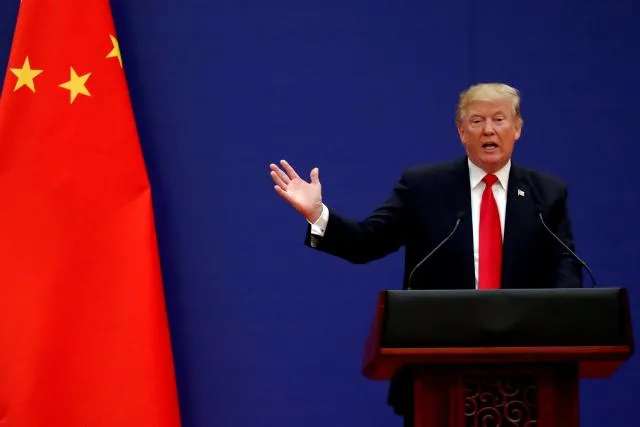Cuộc họp này của nhóm liên minh Five Eyes - bao gồm các nước Mỹ, Úc, Anh, Canada, New Zealand, được xem như một dấu hiệu của một mặt trận quốc tế nhằm chống lại các hoạt động đầu tư và gây ảnh hưởng ngày một lớn từ phía Trung Quốc. Nhóm liên minh này cùng với một số nước mở rộng như Đức, Nhật Bản, đã cho thấy mối quan ngại ngày càng tăng cao của cộng đồng quốc tế đối với các vấn đề có phạm vi ảnh hưởng toàn cầu.
Trung Quốc đang đối mặt với phản ứng dữ dội từ phía Washington, Canberra và thủ đô các nước; đồng thời cũng bác bỏ cáo buộc rằng họ đang tìm cách gây ảnh hưởng đến Chính phủ nước ngoài và các khoản đầu tư từ phía Trung Quốc đều mang định hướng chính trị.

Tổng thống Mỹ Donald Trump phát biểu trong lần đến thăm Trung Quốc vào ngày 9/11/2017 (Ảnh: Reuter)
Thời gian gần đây tuy từ phía Mỹ, Tổng thống Donald Trump tuyên bố sẽ một mình chuẩn bị cho các hoạt động chống lại Trung Quốc, nhưng sự tăng cường phối hợp của các quốc gia thành viên mạng lưới Five Eyes cũng cho thấy một liên minh không chính thức chống lại Bắc Kinh đang dần hình thành rõ nét.
Điều này cũng góp phần làm hụt mong muốn của Trung Quốc trong tham vọng tiến gần hơn tới các nước châu Âu, vốn cũng đang chịu ảnh hưởng từ chính sách "Nước Mỹ là trên hết" của Donald Trump.
Ngoài Trung Quốc, Nga cũng là quốc gia được nhắc đến trong nội dung cuộc họp. Tuy nhiên, tất cả các quan chức chính phủ của Liên minh Five Eyes đều từ chối bình luận.
Exclusive: Five Eyes intelligence alliance builds coalition to counter China
(Reuters) - The five nations in the world’s leading intelligence-sharing network have been exchanging classified information on China’s foreign activities with other like-minded countries since the start of the year, seven officials in four capitals said.
The increased cooperation by the Five Eyes alliance - grouping Australia, Britain, Canada, New Zealand and the United States - with countries such as Germany and Japan is a sign of a broadening international front against Chinese influence operations and investments.
Some of the officials, who spoke on condition of anonymity because of the sensitivity of the talks, said the enhanced cooperation amounted to an informal expansion of the Five Eyes group on the specific issue of foreign interference.
While China has been the main focus, discussions have also touched on Russia, several said.
“Consultations with our allies, with like-minded partners, on how to respond to China’s assertive international strategy have been frequent and are gathering momentum,” a U.S. official told Reuters. “What might have started as ad hoc discussions are now leading to more detailed consultations on best practices and further opportunities for cooperation.”
All the governments involved, including Germany and Japan, declined to comment.
China, faced with a growing backlash from Washington, Canberra and other capitals, has rejected accusations that it is seeking to influence foreign governments and that its investments are politically driven.
The enhanced coordination by the Five Eyes network suggests that, despite signals from U.S. President Donald Trump that he is prepared to go it alone in the confrontation with China, members of his administration are working hard behind the scenes to put together an informal coalition to counter Beijing.
It also represents another blow to China’s fading hopes of convincing European countries, unsettled by Trump’s “America First” policies, to distance themselves from Washington and move closer to Beijing.




